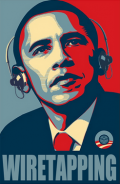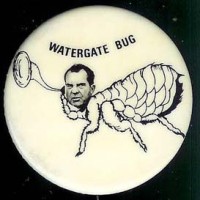QUINNIPIAC POLL: American voters say 55 – 34 percent that Edward Snowden is a whistle-blower, rather than a traitor, according to a Quinnipiac University national poll released today. In a massive shift in attitudes, voters say 45 – 40 percent the government’s anti-terrorism efforts go too far restricting civil liberties, a reversal from a January 14, 2010, survey by the independent Quinnipiac (KWIN-uh-pe-ack) University when voters said 63 – 25 percent that such activities didn’t go far enough to adequately protect the country. Almost every party, gender, income, education, age and income group regards Snowden as a whistle-blower rather than a traitor. The lone exception is black voters, with 43 percent calling him a traitor and 42 percent calling him a whistle-blower. There is a gender gap on counter-terrorism efforts as men say 54 – 34 percent they have gone too far and women say 47 – 36 percent they have not gone far enough. There is little difference among Democrats and Republicans who are about evenly divided. Independent voters say 49 – 36 percent that counter-terrorism measures have gone too far. Some of the largest growth in those concerned about the threat to civil liberties is among men and Republicans, groups historically more likely to be supportive of governmental anti- terrorism efforts.
“The massive swing in public opinion about civil liberties and governmental anti- terrorism efforts, and the public view that Edward Snowden is more whistle-blower than traitor are the public reaction and apparent shock at the extent to which the government has gone in trying to prevent future terrorist incidents,” said Peter Brown, assistant director of the Quinnipiac University Polling Institute.”The fact that there is little difference now along party lines about the overall anti- terrorism effort and civil liberties and about Snowden is in itself unusual in a country sharply divided along political lines about almost everything. Moreover, the verdict that Snowden is not a traitor goes against almost the unified view of the nation’s political establishment.” MORE
 REPRESENTATIVE RUSH HOLT: According to press reports, we are subject to the collection of phone call metadata from every American. The harvesting of To, From and Bcc data from the emails of Americans. The blanket targeting of encrypted emails or encrypted “cloud storage” data repositories of Americans. The targeting of anyone using Tor (an online anonymization capability). These are just the revelations made to date by the Guardian and The Washington Post, among others.The Electronic Frontier Foundation, analyzing how the National Security Agency is apparently utilizing this data, said on its website: “In sum, if you use encryption they’ll keep your data forever. If you use Tor, they’ll keep your data for at least five years. If an American talks with someone outside the U.S., they’ll keep your data for five years. If you’re talking to your attorney, you don’t have any sense of privacy. And the NSA can hand over your information to the FBI for evidence of any crime, not just terrorism. All without a warrant or even a specific FISA order.” Soon, I will introduce legislation that would repeal the laws that brought us our current “surveillance state”: the Patriot Act and the FISA Amendments Act. My bill would restore the probable cause-based warrant requirement for any surveillance against an American citizen being proposed on the basis of an alleged threat to the nation. And it would, for the first time, provide genuine legal protections for the Thomas Drakes of the world.If we hope to restore and preserve the republic that Hamilton, Patrick Henry and other Founders risked their lives to create, we must end the industrial-scale surveillance and perpetual war mentality that has been foisted on the American people in the name of “national security.” MORE
REPRESENTATIVE RUSH HOLT: According to press reports, we are subject to the collection of phone call metadata from every American. The harvesting of To, From and Bcc data from the emails of Americans. The blanket targeting of encrypted emails or encrypted “cloud storage” data repositories of Americans. The targeting of anyone using Tor (an online anonymization capability). These are just the revelations made to date by the Guardian and The Washington Post, among others.The Electronic Frontier Foundation, analyzing how the National Security Agency is apparently utilizing this data, said on its website: “In sum, if you use encryption they’ll keep your data forever. If you use Tor, they’ll keep your data for at least five years. If an American talks with someone outside the U.S., they’ll keep your data for five years. If you’re talking to your attorney, you don’t have any sense of privacy. And the NSA can hand over your information to the FBI for evidence of any crime, not just terrorism. All without a warrant or even a specific FISA order.” Soon, I will introduce legislation that would repeal the laws that brought us our current “surveillance state”: the Patriot Act and the FISA Amendments Act. My bill would restore the probable cause-based warrant requirement for any surveillance against an American citizen being proposed on the basis of an alleged threat to the nation. And it would, for the first time, provide genuine legal protections for the Thomas Drakes of the world.If we hope to restore and preserve the republic that Hamilton, Patrick Henry and other Founders risked their lives to create, we must end the industrial-scale surveillance and perpetual war mentality that has been foisted on the American people in the name of “national security.” MORE
RELATED: The Church Committee was the United States Senate Select Committee to Study Governmental Operations with Respect to Intelligence Activities, a U.S. Senate committee chaired by Senator Frank Church (D–ID) in 1975. A precursor to the U.S. Senate Select Committee on Intelligence, the committee investigated intelligence gathering for illegality by the Central Intelligence Agency (CIA), National Security Agency (NSA) and Federal Bureau of Investigation (FBI) after certain activities had been revealed by the Watergate affair. A series of troubling revelations started to appear in the press concerning intelligence  activities. First came the revelations of Christopher Pyle in January 1970 of the U.S. Army‘s spying on the civilian population[1][2] and Sam Ervin‘s Senate investigations produced more revelations.[3] Then on December 22, 1974, The New York Times published a lengthy article by Seymour Hersh detailing operations engaged in by the CIA over the years that had been dubbed the “family jewels“. Covert action programs involving assassination attempts against foreign leaders and covert attempts to subvert foreign governments were reported for the first time. In addition, the article discussed efforts by intelligence agencies to collect information on the political activities of US citizens.[4] These revelations convinced many Senators and Representatives that the Congress itself had been too lax, trusting, and naive in carrying out its oversight responsibilities. MORE
activities. First came the revelations of Christopher Pyle in January 1970 of the U.S. Army‘s spying on the civilian population[1][2] and Sam Ervin‘s Senate investigations produced more revelations.[3] Then on December 22, 1974, The New York Times published a lengthy article by Seymour Hersh detailing operations engaged in by the CIA over the years that had been dubbed the “family jewels“. Covert action programs involving assassination attempts against foreign leaders and covert attempts to subvert foreign governments were reported for the first time. In addition, the article discussed efforts by intelligence agencies to collect information on the political activities of US citizens.[4] These revelations convinced many Senators and Representatives that the Congress itself had been too lax, trusting, and naive in carrying out its oversight responsibilities. MORE

